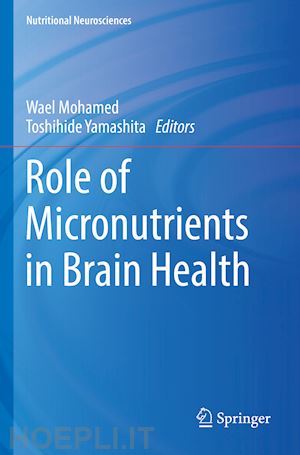
Questo prodotto usufruisce delle SPEDIZIONI GRATIS
selezionando l'opzione Corriere Veloce in fase di ordine.
Pagabile anche con Carta della cultura giovani e del merito, 18App Bonus Cultura e Carta del Docente
This book comprehensively reviews the relationship between micronutrients and brain in health and diseases. It explains the relationship between micronutrients and brain functions, neurogenesis, and cognitive functions. The book also explores the relationship between micronutrients and brain disorders including depression, epilepsy, PD, and Autism. It further explores the recent advancements in understanding the important role of micronutrients as therapeutics in various brain disorders like TBI and AD. Lastly, it presents an overview of micronutrients as neuroprotective agents along with the main principles of nutrigenomics.
Chapter 1. Micronutrients and Neurogenesis.- Chapter 2. Vit-E and Cognitive functions: What is the Interplay?.- Chapter 3. Microbiome and micronutrients.- Chapter 4. Iodine and Brain.- Chapter 5. Tocotrienol and Brain.- Chapter 6. Micronutrients and Depression.- Chapter 7. Micronutrients and Epilepsy.- Chapter 8. Iron Deficiency and brain cognitive functions.- Chapter 9. Micronutrients and PD.- Chapter 10. Malnutrition of Micronutrients and the brain disorders.- Chapter 11. Connections between micronutrients, cerebral monoamines and related brain disorders.- Chapter 12. Micronutrients and Autism.- Chapter 13. Edible Bird’s Nest as Brain Food.- Chapter 14. Phytochemicals as Micronutrients: What is Their Therapeutic Promise in the Management of Traumatic Brain Injury?.- Chapter 15. Phytochemicals as Micronutrients: What is Their Therapeutic Promise in the Management of Alzheimer’s Disease?.- Chapter 16. Nutrigenomics and Brain.
Dr. Mohamed is a clinical pharmacologist, neuroscientist, and psychiatrist. Dr. Mohamed got his PhD from PSU, USA, and is currently working as an assistant professor in IIUM Medical School, Malaysia. Dr. Mohamed has been invited to deliver more than 120 lectures locally and abroad. He has published over 60 peer-reviewed papers related to neuroscience/psychiatry with an h-index of 16. Moreover, he is an editor in Frontiers in Neurology and PLOS-ONE journal, and has edited many journal special issues on brain disorders. Additionally, he is editing a few books in the field of neuroscience with Springer and Cambridge. He has received many research grants from national and international organizations, namely IBRO, ISN, MJF, STDF, FRGS, and INDO-ASEAN, with a total research funding of half a million US dollars. He is now an active partner in GP2 consortium (IPDG-Asia).
Toshihide Yamashita is the Osaka University Distinguished Professor and the head of the Department of Molecular Neuroscience and the Department of Neuro-Medical Science, Graduate School of Medicine, Osaka University. He graduated from Osaka University Medical School in 1990 and had clinical training as a neurosurgeon. His research has focused on restoration and regeneration of the injured or degenerated central nervous system (CNS). In 2005, he received Ameritec Prize (USA), which was awarded in recognition of a specific, significant accomplishment in medical research toward functional recovery from spinal cord injury. The Japan Society for the Promotion of Sciences (JSPS) Prize (2011), Osaka Science Prize (2012), and Commendation for Science and Technology by the Minister of Education, Culture, Sports, Science and Technology (2014) were awarded to him for his discovery of molecular mechanisms regulating the regeneration and plasticity of injured CNS. He has published more than two hundred international original research papers. He is now developing humanized antibody that targets one of the axon growth inhibitors in collaboration with Mitsubishi Tanabe Pharma, and is carrying out the clinical trial for spinal cord injury.











Il sito utilizza cookie ed altri strumenti di tracciamento che raccolgono informazioni dal dispositivo dell’utente. Oltre ai cookie tecnici ed analitici aggregati, strettamente necessari per il funzionamento di questo sito web, previo consenso dell’utente possono essere installati cookie di profilazione e marketing e cookie dei social media. Cliccando su “Accetto tutti i cookie” saranno attivate tutte le categorie di cookie. Per accettare solo deterninate categorie di cookie, cliccare invece su “Impostazioni cookie”. Chiudendo il banner o continuando a navigare saranno installati solo cookie tecnici. Per maggiori dettagli, consultare la Cookie Policy.